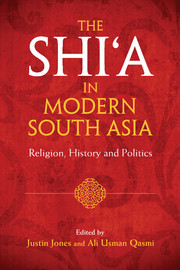Book contents
- Frontmatter
- Contents
- Preface
- Introduction
- 1 Faith Deployed for a New Shiʿi Polity in India
- 2 The Ismaʿili – Isna ʿAshari Divide Among the Khojas
- 3 Local Nodes of a Transnational Network
- 4 Shiʿism, Humanity and Revolution in Twentieth-century India
- 5 Universalising Aspirations
- 6 Muslims, Media and Mobility in the Indian Ocean Region
- 7 Shariʿa, Shiʿas and Chishtiya Revivalism
- 8 Third Wave Shiʿism
- Contributors
- Index
1 - Faith Deployed for a New Shiʿi Polity in India
Published online by Cambridge University Press: 05 May 2015
- Frontmatter
- Contents
- Preface
- Introduction
- 1 Faith Deployed for a New Shiʿi Polity in India
- 2 The Ismaʿili – Isna ʿAshari Divide Among the Khojas
- 3 Local Nodes of a Transnational Network
- 4 Shiʿism, Humanity and Revolution in Twentieth-century India
- 5 Universalising Aspirations
- 6 Muslims, Media and Mobility in the Indian Ocean Region
- 7 Shariʿa, Shiʿas and Chishtiya Revivalism
- 8 Third Wave Shiʿism
- Contributors
- Index
Summary
As the central authority of the Mughal Empire collapsed and was replaced with multiple centres of power and culture, in historiography the eighteenth century in North India is often considered through the lens of crisis, disintegration and instability. Delhi, decentred, became only one of a number of areas of social and political negotiation, partially eclipsed by new cities of probably greater political and cultural significance. These cities had been founded by notables and officials of the declining empire who established themselves as independent rulers: Farrukhabad, Najibabad and Rampur under the Rohillas, Faizabad and Lucknow under the nawabs of Awadh and Murshidabad in Bengal. Similarly, a number of the towns and administrative centres (qasbas) in Awadh, – for example, Nasirabad, Sandila, Sihali (the hometown of the divines and sages of Farangi Mahall in Lucknow), Kakori and Khayrabad – rose to prominence, producing their own forms of courtly and learned culture that provided scholars and literati for the new centres such as Lucknow. In this sense, the qasbas were depositories and determinants of the contested Islamic traditions: Sunni vs. Shiʿi, scripturalist vs. rationalist, nomocentric vs. mystically inclined. Of great significance in this process was the rise of successor states and new centres that had been founded and ruled by Shiʿi notables, usually of Iranian origin, who promoted their faith to legitimise their authority, patronising both the culture and scholarship of the Shiʿi learned classes.
The most prominent of these areas was Awadh, focusing first on Faizabad and then later on Lucknow. Given the previous marginality of the Shiʿi presence in North India (at least beyond some limited elite circles at the Mughal court, especially in the reign of Jahangir), the power that lay with the Shiʿi notables in these new centres, as well as at the court in Delhi, meant that Shiʿi thought and practices flourished throughout the century. In the face of this new challenge, there was a striking response from Sunni elites, both political and religious.
- Type
- Chapter
- Information
- The Shi‘a in Modern South AsiaReligion, History and Politics, pp. 12 - 35Publisher: Cambridge University PressPrint publication year: 2015



